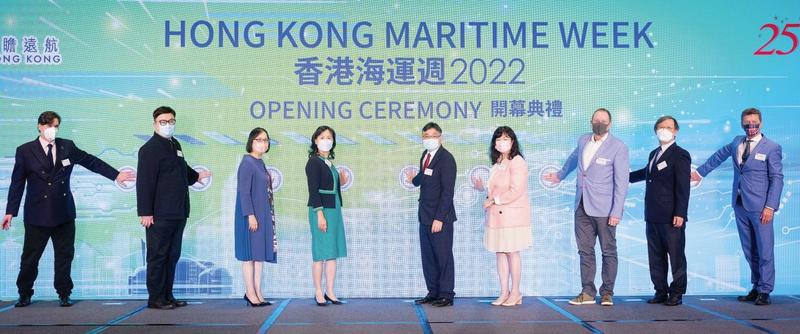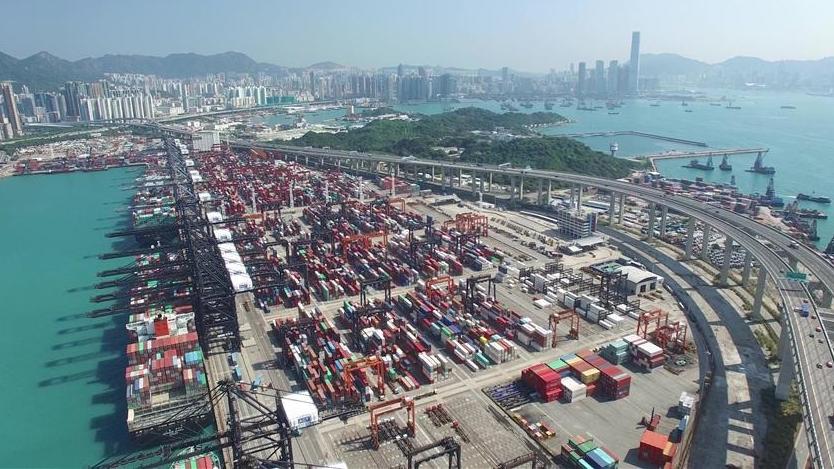 Lam Sai-hung (center), chairman of the Hong Kong Maritime and Port Board and secretary for transport and logistics, together with other guests of honor, officiates at the opening ceremony of Hong Kong Maritime Week 2022 on Monday. (PHOTO PROVIDED TO CHINA DAILY)
Lam Sai-hung (center), chairman of the Hong Kong Maritime and Port Board and secretary for transport and logistics, together with other guests of honor, officiates at the opening ceremony of Hong Kong Maritime Week 2022 on Monday. (PHOTO PROVIDED TO CHINA DAILY)
Hong Kong will develop an action plan to promote the city’s value-added logistics development integrating sea, air and land transport to strengthen its pivotal role in the Guangdong-Hong Kong-Macao Greater Bay Area connectivity.
The remarks were made by the chief executive of the Hong Kong Special Administrative Region, John Lee Ka-chiu, at the opening ceremony of Hong Kong Maritime Week 2022 in a recorded speech on Monday.
Lee was unable to attend the event in person on Monday after testing positive for COVID-19 following his return to Hong Kong from Bangkok, Thailand on Sunday.
The 14th Five-Year Plan (2021-2025) champions Hong Kong’s status as an international shipping center that includes the development of high value-added maritime services for better integration into our country’s overall progress. And more specifically, Hong Kong’s role in the development of a world-class port cluster.
John Lee Ka-chiu, Chief Executive
Maritime Week from Nov 20-26 showcases more than 40 conferences, seminars, receptions and other gatherings organized by 60 Hong Kong and international maritime industry organizations and professional bodies covering various maritime industry-related issues. Flagship activities such as the Asian Logistics, Maritime and Aviation Conference will be hosted on Tuesday.
“The 14th Five-Year Plan (2021-2025) champions Hong Kong’s status as an international shipping center that includes the development of high value-added maritime services for better integration into our country’s overall progress. And more specifically, Hong Kong’s role in the development of a world-class port cluster,” the chief executive said.
ALSO READ: Healthcare services in GBA to be further integrated
“We will launch a maritime services traineeship scheme next year targeting young people looking to maritime law for their future. Next year, we will also launch a new scheme for high value-added maritime services,” Lee said.
The chief executive added that the government is setting up a port community system through which there will be data-sharing among operators and other stakeholders to boost the competitiveness of the Port of Hong Kong.
Hong Kong boasts of one of the world’s 10 busiest container ports, handling nearly 18 million TEUs in 2021. The city has some 270 weekly international container vessel sailings connecting to nearly 600 destinations worldwide, Lee said.
Nearly 900 shipping-related companies have established a presence in the city, ranging from ship broking management and charting to maritime finance and law and insurance.
Hong Kong is the world’s fourth largest shipping registry in terms of gross tonnage, with more than 2,400 ships with a gross tonnage of about 128 million tons. The government has established Hong Kong shipping registry regional desks in seven international cities.
ALSO READ: Hong Kong, Nansha at the heart of GBA’s growth
 This undated photo shows the Kwai Tsing Container Terminals in Hong Kong. (XINHUA)
This undated photo shows the Kwai Tsing Container Terminals in Hong Kong. (XINHUA)
The government will continue to take measures to promote the development of the maritime industry, such as providing tax relief for shipping companies, developing smart ports, and introducing new measures for manpower development in the maritime industry.
Lam Sai-hung, Secretary for Transport and Logistics and chairman of the Hong Kong Maritime and Port Board
Secretary for Transport and Logistics Lam Sai-hung, who is also the chairman of the Hong Kong Maritime and Port Board, said: “The government will continue to take measures to promote the development of the maritime industry, such as providing tax relief for shipping companies, developing smart ports, and introducing new measures for manpower development in the maritime industry.”
In July, the SAR government launched a new half-rate profits tax concessionary regime for qualifying commercial principals, shipping agents, shipping managers and shipbrokers, following earlier preferential tax regimes for ship leasing companies, ship leasing managers and marine insurance.
“According to a recent study by the Hong Kong Polytechnic University and the Hong Kong Shipowners Association, the maritime industry is estimated to (have) contributed 3.7 percent of Hong Kong’s gross domestic product in 2020 and also (to have) contributed to 4.5 percent of the total employment in the same year,” Lam said at the Monday ceremony.
In 2021, Hong Kong was the world’s sixth-largest trading center, accounting for 3.1 percent of international merchandise trade, with nearly 90 percent of the volume of the city’s external merchandise trade to-date carried by water, according to government statistics.
READ MORE: Talent needs among GBA’s listed companies grow
The SAR government has recently taken steps to bolster the city’s competitiveness as a global shipping hub. The International Chamber of
Shipping established its first overseas office in Hong Kong in 2019, while the Baltic and International Maritime Council listed Hong Kong as one of its four recognized arbitration venues in 2020.
Maritime Week 2022 is organized by Hong Kong Maritime and Port Board, co-organized by Hong Kong Shipowners Association and Hong Kong Maritime Museum.


